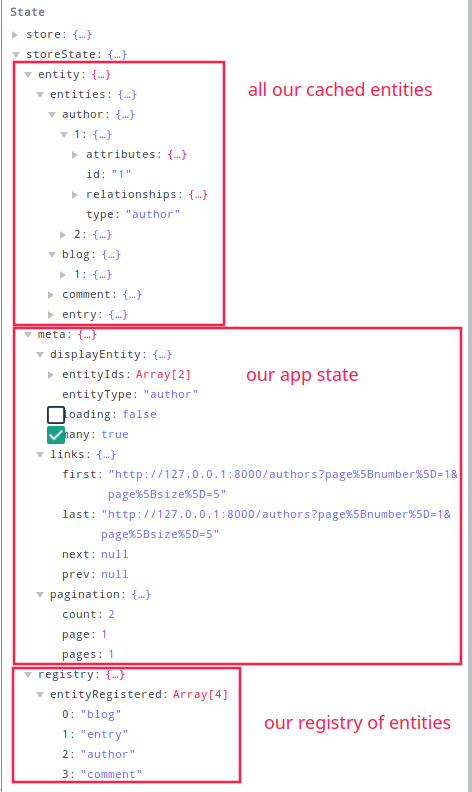Before running this app, make sure the backend supports CORS request. This is necessary as in development mode, both react and django apps are running on different ports.
In my case, I installed django-cors-header following this guide.
Backend Endpoint: This app consumes
127.0.0.1:8000, you can always update it insrc/constants.js
Our redux store is composed of 3 parts/namespaces:
| namespace/reducer | purpose |
|---|---|
| entity | where all the entities (eg: blog, comment, etc) are store. |
| meta | where all the app state is stored. Eg: currentDisplayEntity, currentPagination, etc. |
| registry | where list of available entities is stored. This is supposed to be obtained with GET /. |
This is how our initial redux state looks like:
{
entity: {
entities: {
/**
* sample data:
* blog : {
* [blogId]: { /blog dataObj/ } // This structure facilitates CRUD in future
* }
*/
}
},
meta: {
pagination: {
page: 1, // current page
pages: 1, // total pages
count: 0, // item count
},
links: {
first: null,
last: null,
next: null,
prev: null,
},
displayEntity: {
loading: false,
many: false, // Value is an array ? many = true : many = false
entityType: null, // blog, etc
entityIds: null // Value is an array or object
},
},
registry: {
entitiesRegistered: []
}
}When a response is received, we store the data and any included data into our
entity store based on the type (or entityType).
Eg: when a response of below is received, the app would store each part of the data into various parts of our redux store:
{
"links": { // *** this will be stored into `store.meta.links`
"first": "http://localhost:8000/entries?page%5Bnumber%5D=1",
"last": "http://localhost:8000/entries?page%5Bnumber%5D=1",
"next": null,
"prev": null
},
"data": [
{
"type": "posts", // *** this will be stored into `store.entity.entities.entry`
"id": "1",
"attributes": {
"headline": "This is a test, this is only a test",
"bodyText": "And this is the body text for the blog entry. To see comments included in this payload visit: /entries/1?include=comments",
"pubDate": "2015-01-01",
"modDate": "2015-04-05"
},
"relationships": {
"blog": {
"data": {
"type": "blog",
"id": "1"
}
},
"blogHyperlinked": {
"links": {
"self": "http://localhost:8000/entries/1/relationships/blog_hyperlinked",
"related": "http://localhost:8000/entries/1/blog"
}
},
"authors": {
"meta": {
"count": 1
},
"data": [
{
"type": "author",
"id": "1"
}
]
},
"comments": {
"meta": {
"count": 1
},
"data": [
{
"type": "comment",
"id": "1"
}
]
},
"commentsHyperlinked": {
"links": {
"self": "http://localhost:8000/entries/1/relationships/comments_hyperlinked",
"related": "http://localhost:8000/entries/1/comments"
}
},
"suggested": {
"links": {
"self": "http://localhost:8000/entries/1/relationships/suggested",
"related": "http://localhost:8000/entries/1/suggested/"
},
"data": [
{
"type": "entry",
"id": "2"
}
]
},
"suggestedHyperlinked": {
"links": {
"self": "http://localhost:8000/entries/1/relationships/suggested_hyperlinked",
"related": "http://localhost:8000/entries/1/suggested/"
}
},
"tags": {
"data": []
},
"featuredHyperlinked": {
"links": {
"self": "http://localhost:8000/entries/1/relationships/featured_hyperlinked",
"related": "http://localhost:8000/entries/1/featured"
}
}
},
"meta": {
"bodyFormat": "text"
}
}
],
"included": [
{ // *** this will be stored into `store.entity.entities.comment
"type": "comment",
"id": "1",
"attributes": {
"body": "Love this article!"
},
"relationships": {
"writer": {
"data": {
"type": "writers",
"id": "2"
}
},
"entry": {
"data": {
"type": "entry",
"id": "1"
}
},
"author": {
"data": {
"type": "author",
"id": "2"
}
}
}
}
],
"meta": {
"pagination": { // *** this will be stored into `store.meta.pagination`
"page": 1,
"pages": 1,
"count": 2
}
}
}This is how our redux store looks like after inserting data:
In our redux store, we store the current app state in store.meta.
However, instead of storing the entire object as metadata, we store current entity type and id.
Upon rendering, the component shall retrieve data from store.entities
using currentEntityType and currentEntityIds.
In case we want to add extra entity/model in future, all we have to do is just simply update our registry.
Our entities are stored using associative array with the entityId as index.
Eg:
{
entities: {
blog: {
1: {type, id, attributes...},
2: {type, id, attributes...},
}
}
}Using associative array makes data accessing more efficient,
all we need is a pair of object keys (entityType and entityId).
Thus, in case of any CRUD, we can always update our store without having to traverse the entire collection of entities in our redux store.
The UI is designed in a way that retrieve data with this logic:
- Search from redux store.
- If not found -> retrieve from backend, then update the redux store.
In this way, we could prevent any unnecessary network request.

